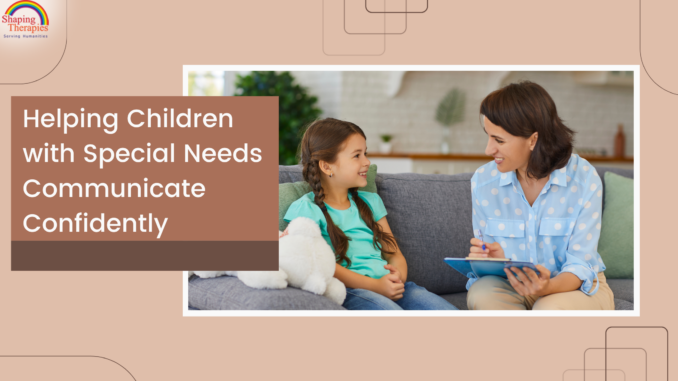
Introduction
Imagine a child struggling to express their feelings and needs due to communication barriers. This can lead to frustration for the child and their caregivers. For children with Special needs, effective communication is a vital stepping stone to their overall development. Communication is more than just speaking; it encompasses listening, understanding, and expressing ideas and emotions. This blog explores how to help children with special needs communicate confidently and the pivotal role played by Shaping Therapies Powai, one of the Best Speech Therapy Centres in Powai.
A child with Special needs often faces unique challenges, especially when their intelligence quotient (IQ) is between 20 and 35, coupled with difficulties in language and behaviours. Assisting such children requires a thoughtful and multidimensional approach, such as:
- Task Analysis: Breaking down tasks into smaller, manageable steps with clear details and durations.
- Peer Teaching: Encouraging learning through peer interactions, where one child teaches another.
- Cooperative Learning: Using small teams of children with varying abilities to foster understanding through group activities.
- Emotional Support: Building confidence and creating a safe emotional environment.
- Multisensory Approaches: Incorporating visual, tactile, and auditory methods to make learning engaging and effective.
Every child, especially those with Special needs, requires love, encouragement, and support to build their confidence and self-worth. Assisting them isn’t just about addressing their immediate challenges—it’s about empowering them with the emotional and social tools to navigate their world independently. Let’s delve into how to help these children communicate confidently.
Common Communication Challenges in Children with Special Needs
Children with special needs often face unique communication hurdles. These may include difficulty in understanding language, limited vocabulary, or challenges in forming sentences. Non-verbal communication, such as maintaining eye contact or using gestures, can also be a struggle.
Learning disabilities, Autism Spectrum Disorders, and developmental delays may amplify these challenges, affecting a child’s social interactions and academic progress. These barriers emphasize the importance of professional intervention, such as consulting a Speech Therapist in Powai for guidance.
Such barriers can lead to emotional struggles like low self-esteem, anxiety, and irritability, making it even harder for these children to connect with their peers or excel in academics. Addressing these challenges requires professional intervention and supportive strategies at home.
The Power of Speech Therapy
Speech therapy can make a transformative difference in a child’s life. Our Speech Therapist specializes in helping children overcome their specific challenges, enhancing both verbal and non-verbal communication skills. Here are the key benefits:
- Enhanced Vocabulary and Understanding: Children learn to comprehend language better, improving their ability to express themselves.
- Improved Pronunciation: Therapy helps children articulate words clearly, making their speech easier to understand.
- Stronger Social Skills: With guidance, children can develop the ability to interact confidently with peers.
- Academic Growth: Improved communication paves the way for better participation in school activities.
- Emotional Resilience: Overcoming communication barriers builds confidence and reduces frustration.
These benefits highlight why seeking Shaping Therapies, Powai who is one of the Best Speech Therapy Centre for children with special needs.
Strategies for Supporting Communication at Home
Parents play a crucial role in reinforcing communication skills at home. Here are some practical tips to support your child:
- Model Clear and Concise Language: Speak slowly and clearly, using simple words and short sentences. This helps children understand and replicate proper language usage.
- Encourage Non-Verbal Communication: Teach your child to use gestures, facial expressions, and other non-verbal cues to express themselves.
- Create a Supportive Environment: Foster a safe and encouraging space where the child feels comfortable trying to communicate, even if mistakes occur.
- Use Visual Aids: Incorporate flashcards, pictures, and visual schedules to help children associate words with objects or actions.
- Practice through Play: Engage in interactive games that encourage communication, such as role-playing or storytelling.
- Listening Actively: Spend quality time listening to your child. This shows they are valued and helps them express themselves better.
A consistent, nurturing approach at home can significantly complement professional therapy provided by our Speech Therapist
Why Is Communication Important in Learning Disabilities?
Effective communication is integral to every aspect of a child’s life, especially for those with learning disabilities. Communication skills directly impact their ability to:
- Participate in classroom activities.
- Build relationships with peers and family members.
- Express their needs and emotions.
- Develop independence and self-confidence.
By addressing these areas through professional intervention and at-home support, children can achieve remarkable progress.
Emotional Support for Children With Special Needs
Children with special needs often struggle with emotional regulation, which can compound their communication difficulties. Providing emotional support is crucial to their overall development:
- Professional Help: Engage therapists, psychiatrists, or counselors who specialize in the child’s specific needs.
- Social Skill Building: Address difficulties in naming feelings or expressing emotions explicitly.
- Encouraging Peer Interactions: Support opportunities for children to interact and build relationships.
Conclusion
Helping children with special needs communicate confidently is not just about improving their speech it’s about unlocking their potential to connect with the world around them. With expert guidance from the Best Speech Therapist from Shaping Therapies, Powai has to offer and consistent parental support; these children can overcome their communication barriers and thrive.
Our dedicated team works to ensure every child’s communication challenges are addressed effectively. Contact us today to begin the journey toward confident communication! Start your child’s journey today by contacting Shaping Therapies, Powai in helping children communicate and grow!

Leave a Reply